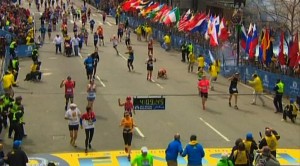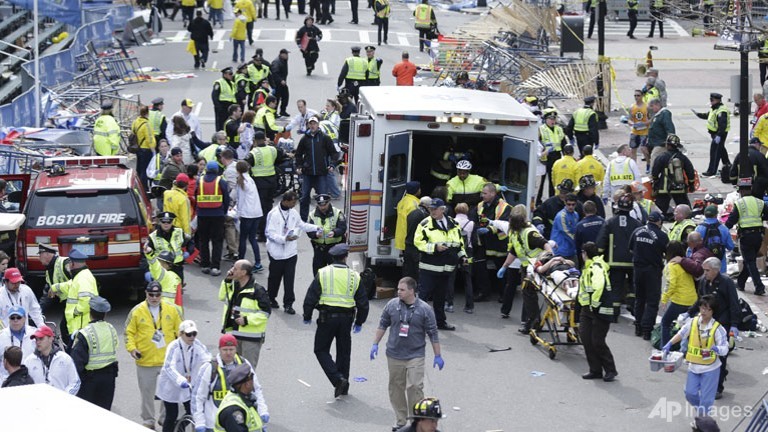IT WAS 4 hours, 9 minutes and 43 seconds into Monday’s Boston Marathon and Randy Clever – a 63-year-old retired city worker from Germantown – was just a few weary steps from the finish line and beginning to raise his hands in triumph when he heard a loud boom.
In his red singlet and blue hat, Clever looked over his shoulder and raised his hands even higher, this time in fear.
“I thought it was some kind of explosion,” he said. “But I didn’t think it was a bomb. . . . When the second explosion happened, I knew it was a bomb.”
The Philadelphia man was at ground zero for a new American tragedy, a brazen assault on one of the nation’s best-known marathons that left at least three people dead, including an 8-year-old boy, and injured more than 140 others in the worst bombing on American soil since the 9/11 attacks .
The two explosive devices went off at 2:50 p.m. on a cool and partly sunny day in Boston. The bombs detonated after most of the 23,000 runners had already crossed the finish line in Copley Square, cheered on by a large throng of spectators enjoying Massachusetts’ Patriots’ Day holiday and packing the city’s narrow streets.
The blasts, just about 12 seconds apart, were captured by several news and video cameras poised near the finish line that showed a bright orange flash on the sidewalk followed by a plume of dense smoke. The force of the explosion appeared to blow back several runners – including a 78-year-old man from Washington state who crumpled to the pavement – before first responders raced to sidewalks stained in deep-red blood to tend to the injured.
The latest reports Monday night said in addition to the three known fatalities, at least 144 others were treated for injuries – about 15 of them critical – at Boston-area hospitals. CNN reported there had been 10 amputations.
As many as a dozen of the injured were reportedly children. Ironically, marathon officials had dedicated the last mile of the course where the explosions took place to the 20 first-graders who were killed in December in the Newtown, Conn., school massacre. And authorities Monday night were still testing other suspicious devices that had been found on or near the marathon route.
The midafternoon mayhem came as something of a shock to the American psyche. Politicians, pundits and the public had been debating domestic gun violence while more overt acts of terrorism, and the fears that such acts inspire, were seemingly starting to fade into a past era, a time that many had hoped ended with the killing of 9/11 mastermind Osama bin Laden in 2011.
Early in the evening, President Obama seemed to echo the grim cadences of that time when he appeared in the White House press-briefing room to declare: “We will find out who did this; we’ll find out why they did this. Any responsible individuals, any responsible groups will feel the full weight of justice.”
Just like after 9/11, there were numerous reports of “secondary devices” in Boston hotels or elsewhere in the New England city – although most of those reports, such as a suspicious fire or blast at the John F. Kennedy Library on the outskirts of the city, proved ultimately to be unfounded or unrelated.
Mayors and police commissioners in major U.S. cities announced stepped-up security while boosting police presence in train stations and other public places. Mayor Nutter said at a City Hall news conference that Philadelphia is on high alert.
There was no immediate word on who was behind the bombings, and authorities were reluctant to even use the loaded word “terrorism,” leaving open the possibility that the devices – which were described as small, despite the casualties – could have been the work of a deranged suspect acting alone. No one claimed responsibility, and despite inevitable and widespread speculation, there was no clear proof of connections either to al Qaeda, the perpetrators of 9/11, or to domestic terror like that in the 1995 Oklahoma City bombing by Timothy McVeigh.
“We still do not know who did this or why,” Obama said Monday evening. “And people shouldn’t jump to conclusions before we have all the facts. But make no mistake – we will get to the bottom of this.”
Monday was Patriots’ Day in Massachusetts, a state holiday on the third Monday in April that commemorates the anniversary of the battles of Lexington and Concord that initiated the American Revolution in 1775. It’s intended to be a festive day, marked by historic re-enactments, morning Red Sox baseball at Fenway Park, and the Boston Marathon, the event that has become a Holy Grail for distance runners since its founding in 1897.
The runners went out in waves between 10 and 10:40 a.m., and so about three-quarters of the competitors had already crossed the finish line on Boylston Street when the explosions took place. The marathon attracts runners from all over the world and around the United States, including scores of participants from the Philadelphia area.
Jill Beccaris-Pescatore of Glenside, a 45-year-old economics professor at Montgomery County Community College, had been working several years to qualify for what was her first run in the Boston race Monday. She crossed the finish line at 2:40 p.m. and was waiting for her clothing bag when she heard the blasts.
“It sounded like a cannon,” said Beccaris-Pescatore. “It definitely sounded like an explosion. People know that it didn’t sound right.”
Greta Garecht, a Burholme resident who had run the Boston Marathon once before in 2010, had crossed the finish line a few minutes before the explosions. She said that after the second blast, runners began to realize that something was wrong.
“Then everyone really kind of started panicking. It was really weird and eerie,” said Garecht, 30, a librarian at Gateway Regional High School in Woodbury Heights, N.J.
Garecht, who is four months pregnant, said she carried her phone during the race and immediately called her father, who was there with his wife, Garecht’s husband, her 9-month-old daughter, her brother and her brother’s girlfriend. Her dad informed her he was at the hotel about two miles away, but the rest of the family was at the finish line, which momentarily caused Garecht to lose control.
“I completely panicked and broke down,” she recalled. Garecht eventually found out her family was safe, along with four co-workers who were also at the race.
Germantown’s Clever, a retired program manager for the city’s Department of Public Health, said volunteers at the finish line ushered him and dozens of others down the street after the blast, while security and medics rushed toward the smoke.
“It was so disturbing. It was so chaotic. Runners were all looking around wondering what was going on. People were crying and upset, even though right then they didn’t know what was going on.” He said he didn’t see anyone who had been injured. “They wouldn’t let us go back. We had to keep moving.”
Like many other runners, Clever was worried about his family’s whereabouts, even though they were supposed to be in a waiting area for runners whose last names started with “C.”
“But what if they had come to see me at the end? That was my biggest fear. What if?” he asked, his voice trailing off. “But they were all there under the C,” he said, his voice cracking. “It was quite emotional. It was overwhelming, really. Everyone was so relieved we were all OK.”
In the wake of the bloodshed, many worried that the terroristic nature of the attack would return America back to the state of mind that prevailed right after 9/11, when fears of new violence clouded everything from outings at Walt Disney World to high school football games. Boston journalist Charles Pierce, writing for Esquire, raced down to the scene Monday and called the Boston Marathon “one of the last big open events in a society closing in on itself from every direction.”
But many vowed not to change their routine in the face of potential violence. One of them was Glenside’s Beccaris-Pescatore, who had worked so long to qualify for the Boston Marathon and said she’s determined to return.
“We’ll do it again next year – we’ll be back,” she said roughly 90 minutes after the explosions. “This kind of stuff just angers you. Whoever would do such a thing to all these people who came out to see their friends and family?”
Two bombs exploded in the crowded streets near the finish line of the Boston Marathon on Monday, killing three people and injuring more than 130 in a bloody scene of shattered glass and severed limbs that raised alarms that terrorists might have struck again in the U.S.
A White House official speaking on condition of anonymity because the investigation was still unfolding said the attack was being treated as an act of terrorism.
President Barack Obama vowed that those responsible will “feel the full weight of justice.”
A senior U.S. intelligence official said two other bombs were found near the end of the 26.2-mile course in what appeared to be a well-coordinated attack.
The fiery twin blasts took place about 10 seconds and about 100 yards apart, knocking spectators and at least one runner off their feet, shattering windows and sending dense plumes of smoke rising over the street and through the fluttering national flags lining the course. Blood stained the pavement, and huge shards were missing from window panes as high as three stories.
“They just started bringing people in with no limbs,” said runner Tim Davey of Richmond, Va. He said he and his wife, Lisa, tried to keep their children’s eyes shielded from the gruesome scene inside a medical tent that had been set up to care for fatigued runners, but “they saw a lot.”
“They just kept filling up with more and more casualties,” Lisa Davey said. “Most everybody was conscious. They were very dazed.”
Authorities shed no light on a motive or who may have carried out the bombings, and police said they had no suspects in custody. Authorities in Washington said there was no immediate claim of responsibility. The FBI took charge of the investigation.
Police said three people were killed. Hospitals reported at least 134 injured, at least 15 of them critically. The victims’ injuries included broken bones, shrapnel wounds and ruptured eardrums.
At Massachusetts General Hospital, Alisdair Conn, chief of emergency services, said: “This is something I’ve never seen in my 25 years here … this amount of carnage in the civilian population. This is what we expect from war.”
Some 23,000 runners took part in the race, one of the world’s oldest and most prestigious marathons.
One of Boston’s biggest annual events, the race winds up near Copley Square, not far from the landmark Prudential Center and the Boston Public Library. It is held on Patriots Day, which commemorates the first battles of the American Revolution, at Concord and Lexington in 1775.
Boston Police Commissioner Edward Davis asked people to stay indoors or go back to their hotel rooms and avoid crowds as bomb squads methodically checked parcels and bags left along the race route. He said investigators didn’t know whether the bombs were hidden in mailboxes or trash cans.
He said authorities had received “no specific intelligence that anything was going to happen” at the race.
The Federal Aviation Administration barred low-flying aircraft within 3.5 miles of the site.
“We still don’t know who did this or why,” Obama said at the White House, adding, “Make no mistake: We will get to the bottom of this.”






